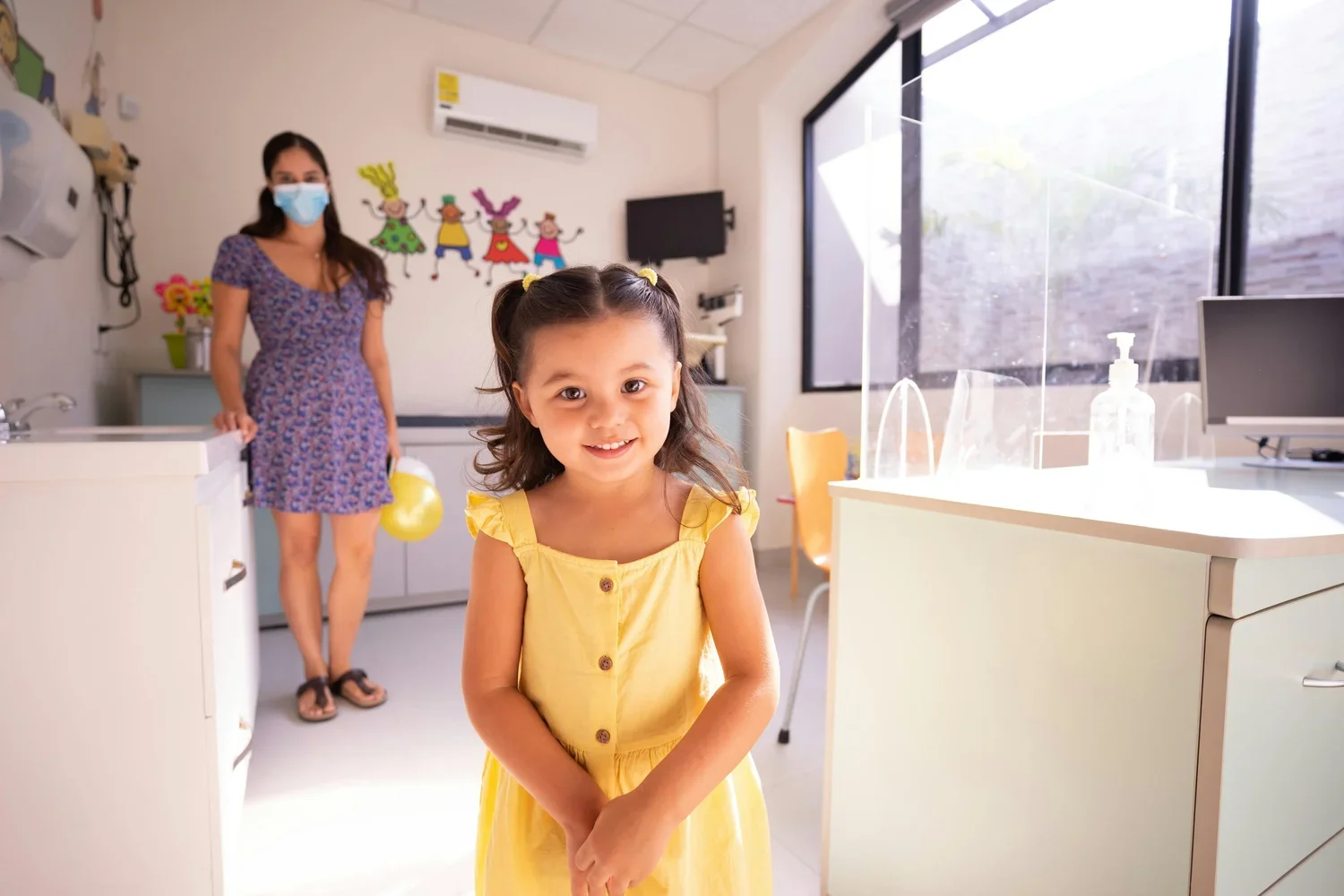
Resources
Parenting & Child Health
-

Utah’s Fluoride Ban: What It Means for Your Child’s Dental Health
In March 2025, Utah became the first state in the U.S. to ban the addition of fluoride to public drinking water, following the passage of House Bill 81, signed into law by Governor Spencer Cox. This legislation prohibits municipalities from adding fluoride to their water systems, emphasizing individual choice over community-wide dental health measures.
-

Addressing Common Growth Concerns Among Children
Understanding when to monitor growth more closely — and when to take action — is key to ensuring your child reaches their full potential, both physically and developmentally.
-

HG in Pregnancy: Recognizing It Early and Supporting Holistically
We see the long-term effects that pregnancy experiences can have on parents and babies alike — which is why early support during pregnancy is so important. One condition that is often under-recognized, under-treated, and incredibly taxing is Hyperemesis Gravidarum (HG).
-

Persistent Sniffles? Understanding Allergy Symptoms in Kids and Families
When cold symptoms drag on for weeks — especially in spring or fall — it's worth considering that allergies, not illness, could be the cause. If everyone in the family is sneezing, congested, or sniffling around the same time each year, seasonal or environmental allergies may be to blame.
-

Helping Your Child Sleep Better: Simple Hypnotic Techniques You Can Teach at Home
Using simple hypnotic techniques at home, you can teach your child how to quiet their mind, relax their body, and naturally ease themselves into restful sleep. Clinical hypnosis for children isn’t about “mind control” — it’s about teaching kids to focus their attention in helpful ways and activate the natural relaxation systems in their bodies.
-

Understanding Measles: Why Vaccination is Crucial for Your Child’s Health and Safety
One of the most contagious and dangerous of these diseases is measles. While the measles vaccine has proven to be an effective and crucial part of public health, the disease remains a serious threat to children who are not vaccinated or are in communities with low vaccination rates.
-

An Integrative Approach to Managing Seasonal Allergies
There are several approaches to managing seasonal allergies, combining both standard medical treatments and integrative solutions to help minimize triggers and improve your child’s quality of life.
-

Supporting Families with Group B Strep Screening: Strategies for Protecting Newborn Health
This article aims to clarify the facts about GBS, the benefits of antibiotics during labor, and how to optimize newborn health if a mother tests positive for GBS.
-

Is It Safe to Use Q-Tips in Your Child's Ears?
Q-tips are a commonly used method for keeping ears clear for both children and adults, but you may have heard safety warnings about them. It’s true that Q-tips come with safety risks, but does that mean you should avoid them altogether?
-

Fevers in Children: When to Worry and When to Remain Calm
One of the most common concerns parents have is when their child develops a fever. While fever can be alarming, it’s important to understand that a fever itself is not necessarily dangerous—it’s often a sign that the body is fighting an infection (most commonly a virus). However, knowing when to be concerned and when to remain calm can make all the difference in how you care for your child during these times.
-

RSV: What Every Parent Needs to Know
One of the most common respiratory illnesses I see during the colder months is Respiratory Syncytial Virus (RSV). While many parents may not be familiar with it, RSV is one of the leading causes of respiratory illness in young children, particularly those under the age of 2.
-

Favorite Cold Season Home Remedies for Kids: What Works and What to Avoid
While there's no magic cure for the common cold, several natural remedies may help alleviate symptoms and support your child’s immune system.
-

Whooping Cough Awareness: Keeping Infants Safe and Healthy
Whooping cough, or pertussis, is an infection of the respiratory system caused by Bordetella pertussis bacteria. This causes severe coughing spells, which can result in a “whooping” sound when the child breathes in.
-

Essential Oil Safety in Kids
Essential oils can have many health benefits but some caution should be used in children - especially young children. Children have more sensitive skin & lungs compared to adults, making them more susceptible to adverse reactions.
-

Could Leucovorin Help Kids and Teens on the Autism Spectrum?
As parents, we’re always looking for safe, evidence-based ways to support our children’s development. If your child or teen has been diagnosed with autism spectrum disorder (ASD), you may have heard about a supplement called leucovorin.
Also known as folinic acid, leucovorin is gaining attention in the autism community for its potential to improve not just language and communication, but also emotional regulation and anxiety in some children and teens.
-

Summer Safety Tips: Water, Sun & Bug Bites
As the summer sun warms up our days, families head outside to make memories at the pool, park, and on vacation. Along with the fun comes the need for a few extra precautions to keep kids safe from drowning risks, sun damage, and pesky mosquito bites. Here’s a guide—with some integrative medicine insights—to help your family enjoy the season with confidence.
-

Summer Itch: A Parent’s Guide to Poison Ivy, Poison Oak, and Stinging Nettle
Summer is prime time for hiking, camping, fort-building in the woods, and barefoot backyard adventures. Unfortunately, it’s also peak season for itchy rashes caused by plants like poison ivy, poison oak, and stinging nettle. At Healing Arts Pediatrics, we often see a spike in visits during this season related to these irritating, but preventable, skin reactions.
-

Mold Exposure and Children’s Health: Facts, Fears, and What Parents Really Need to Know
In recent years, mold exposure has become a go-to explanation for a wide range of childhood symptoms—everything from fatigue and brain fog to behavioral challenges and chronic congestion.
-

Halloween Safety Tips for a Fun and Healthy Night
Halloween is one of the most exciting nights of the year for kids. Costumes, candy, and glowing jack-o’-lanterns make for magical memories. At the same time, it’s important for parents to plan ahead so the night stays safe, healthy, and enjoyable for the whole family.
-

Staying Healthy During the Holidays: Protecting Your Family from Winter Viruses
The holiday season brings joy, connection, and travel—but also an increased risk of catching and spreading viruses like colds, flu, RSV, and COVID-19. With families gathering indoors and children sharing space and hugs with relatives, it’s the perfect environment for germs to circulate.
Here are evidence-based strategies to help your family stay healthy, plus guidance on what to keep in your medicine cabinet in case illness strikes.
-

Snow Season Safety: Keeping Your Kids Healthy and Happy All Winter Long
Winter in Utah is magical—fresh powder, sledding hills, and family ski days—but it also brings hazards that can catch families off guard. As pediatricians, we see a predictable rise in cold-related injuries, respiratory illnesses, and accidents once the snow begins to fall. With a little preparation and a few safety habits, your family can enjoy everything winter has to offer while minimizing risk. This guide covers the essentials of snow-season safety for children of all ages.
-

Teething 101 for Parents: Normal Signs, Red Flags, and Gentle Support
Teething is one of the most universal developmental stages in infancy, yet it remains a source of uncertainty and worry for many parents. Nearly all babies will experience some degree of discomfort as their first teeth erupt, typically beginning between 4 and 7 months of age. Much of this process is entirely normal, and understanding what to expect can help parents support their baby with confidence.
Natural Health & Detoxification
-

Detoxing: Realities and Myths
In recent years, the concept of "detoxing" has become increasingly popular, with many people turning to various cleanses and supplements in hopes of ridding their bodies of toxins. In this article, I’ll debunk common detox myths and provide an alternative perspective on how to support children’s health naturally.
-

GI relief for people of all ages
Gastrointestinal (GI) symptoms such as diarrhea, vomiting, and dehydration are common issues that can affect people of all ages, from infants to adults. While these symptoms can be uncomfortable and disruptive, there are natural remedies available that may help alleviate discomfort and promote hydration.
-

Parasite Cleanses: Separating Fact from Fiction
If you’ve spent time on social media lately, you may have seen posts warning about “hidden” parasites and promoting over-the-counter or herbal parasite cleanses. While these messages can be attention-grabbing (and even a little scary), it’s important to separate fact from fiction—especially when it comes to your family’s health.
-

Product Highlight: Traditional Medicinals Throat Coat® Tea
When your child comes down with a cold or sore throat, few things feel as soothing as a warm cup of tea with honey. One of my favorite options for older kids and adults is Traditional Medicinals Throat Coat®, an organic herbal tea designed to soothe the throat and support recovery during colds, flu, or after a lot of coughing.
Nutrition & Supplementation
-

The Benefits of Vitamin D
Vitamin D, often called the "sunshine vitamin," plays a crucial role in the overall health and development of children. As a pediatrician, I encourage supplementation with vitamin D, especially during the winter and flu season. Vitamin D is not just important for bone health; it has a broad range of benefits for immune function, growth, and development.
-

Cold Weather Prep: Stocking Your Family Medicine Cabinet
As the days get shorter and the temperatures drop, many families find themselves battling more frequent colds, coughs, and fevers. Having a well-stocked medicine cabinet can turn stressful sick days into more manageable ones. Preparing now means fewer late-night pharmacy runs and more confidence in keeping your child comfortable when illness strikes.
Alternative & Holistic Therapies
-

Alternatives to Surgical Intervention for Tongue-Ties
Tongue-tie is a condition present from birth where the frenulum, the band of tissue connecting the underside of the tongue to the floor of the mouth, is shorter or tighter than normal. This restriction limits a baby’s tongue movement and hinders their ability to breastfeed successfully.
-

An Integrative Approach to Vaccines
As an integrative pediatrician, I’m often asked about my approach to vaccines. Well, just like my approach to virtually any child and any health condition, the short answer is: I take a personalized approach. The longer answer is, of course, a little more nuanced, and I’ll do my best to explain it here.
-
The Impact of Technology on ADHD: A Growing Concern
ADHD affects millions of individuals worldwide, characterized by symptoms such as inattention, hyperactivity, and impulsivity. In recent years, there has been a growing concern about how increased technology use—especially among children and adolescents—may exacerbate these symptoms.
Physical Health & Conditions
-

Torticollis
Torticollis, also referred colloquially to as "wryneck" or "twisted neck," is a rare medical condition characterized by the contraction of muscles causing the head to twist to one side.
-

The Role and Benefits of Vitamin K for Babies
Vitamin K is a critical nutrient that plays a key role in various physiological processes, particularly in blood clotting and bone health. For newborns and infants, maintaining adequate vitamin K levels is especially important due to their unique nutritional needs and vulnerability to certain health conditions.
-

Why the Flu Vaccine is Important for Children: A Vital Step for Everyone’s Protection
As flu season approaches each year, one of the most important steps we can take to protect our children is getting them vaccinated against influenza (the flu). The flu is more than just a common cold—it can lead to serious health complications, especially in young children.
-

Measles in Utah: What Parents Need to Know
As of late June 2025, measles cases have been officially reported in Utah. While this disease was once considered eliminated in the U.S., it is making a comeback due to international travel and pockets of under-vaccination.
-

What Every Utah Parent Should Know About Newborn Screening
Utah’s newborn screening program is a vital safety net for your child’s health. It’s fast, painless (aside from a brief heel stick), and can detect more than 40 rare but serious health conditions before symptoms ever appear. Early detection can make the difference between a life filled with opportunity and one limited by illness or disability.
-

Ear Pain: When to Watch, When to Worry, and What You Can Do at Home
Ear pain is one of the most common reasons parents reach out to their pediatrician—and understandably so. It’s distressing for children and parents alike. But not all ear pain is created equal. Understanding the most likely causes can help you make informed decisions about when to treat at home and when it’s worth coming in for a visit.
-

The Hepatitis B Vaccine: A Quiet Way to Protect Your Baby's Future
If you’ve ever wondered whether this vaccine is truly necessary so early, or if you’ve hesitated because of questions or concerns you’ve heard, you’re not alone. Many thoughtful, loving parents wrestle with this decision. In this article, we want to offer a calm, evidence-based explanation of the risks of hepatitis B, how it’s transmitted, and why the vaccine—especially in the first year of life—is such an important layer of protection.
-

Acetaminophen and Autism: What Parents Should Know About the Latest Research
Over the past year, headlines have reignited concern about whether taking acetaminophen (Tylenol or paracetamol) during pregnancy could increase a child’s risk of developing autism or ADHD. As pediatricians, we understand how unsettling these stories can feel for expectant and new parents.
Let’s take a closer look at what the most reliable studies actually show, why some of those fears have been overstated, and how you can use medications safely and confidently.
-

Understanding Croup: What Parents Should Know
If your child has ever woken suddenly in the middle of the night with a harsh, barking cough that sounds like a seal, you know how frightening it can be. The noise can echo through the house, and your child may look panicked or struggle to catch their breath. This common childhood illness, known as croup, can be alarming—but the good news is that most cases are mild, short-lived, and respond well to simple home remedies.
-

HPV Vaccination: What Parents Need to Know About Safety, Protection, and New Recommendations
When the human papillomavirus (HPV) vaccine was first introduced nearly two decades ago, it represented one of the strongest tools ever developed for preventing cancer. Today, HPV vaccination is widely recommended for all adolescents, and its safety and effectiveness are supported by extensive global research. As recommendations continue to evolve—including recent support for single-dose strategies in some countries—parents often seek clear, balanced information to guide decision-making. This article provides an evidence-informed overview designed for families.
Mental & Emotional Health
-

Silent Struggle: Understanding Teen Depression
Adolescence is a time of significant change and transition, marked by physical, emotional, and social development. While it’s normal for teenagers to experience occasional mood swings and periods of sadness, persistent feelings of despair and hopelessness may indicate a more serious mental health issue: depression.
-
The Impact of Technology on ADHD: A Growing Concern
ADHD affects millions of individuals worldwide, characterized by symptoms such as inattention, hyperactivity, and impulsivity. In recent years, there has been a growing concern about how increased technology use—especially among children and adolescents—may exacerbate these symptoms.
-

Anxiety in Disguise: When Big Feelings Show Up in the Body
Children (especially younger ones) don’t always have the words to say, “I’m nervous about going back to school.” Instead, their anxiety might manifest as:
Morning stomachaches or nausea, especially right before school
Loss of appetite or eating less than usual
Difficulty sleeping, frequent nightmares, or early waking
Clinginess or meltdowns at drop-off
Frequent “I don’t feel good” complaints with no fever or other symptoms
Avoidance of school-related tasks like packing a backpack or talking about the new year
This isn’t manipulation. Your child isn’t pretending to be sick to “get out of school”—they’re genuinely experiencing discomfort. Their brain is triggering a stress response, which activates the “fight or flight” system in the body. And one of the most common targets of that stress response? The gut.
-

The Tired Teen: Untangling Sleep, Stress, Screens, and Health
Fatigue is one of the most frequent concerns raised in adolescent medicine. While teens naturally go through biological shifts that alter their sleep needs and patterns, persistent tiredness is not something to ignore. Several categories of factors commonly contribute, sometimes overlapping in ways that make the underlying cause difficult to pinpoint.
Guides for Birthworkers
-

Supporting Natural Detoxification During Pregnancy: Guide for Birthworkers
Many expectant parents today are concerned about "detoxing" and whether they need special diets, cleanses, or supplements to rid their bodies of toxins. It's important to provide evidence-based guidance, empowering parents to support their bodies' natural detox processes in a safe and holistic way.
-

Supporting Mothers, Supporting Babies: Understanding the Risks and Benefits of SSRIs During Pregnancy
As birth workers, you are trusted partners walking alongside families during some of their most vulnerable and transformational moments. One of the common and sensitive issues you may encounter is the use of antidepressants, particularly selective serotonin reuptake inhibitors (SSRIs), during pregnancy and breastfeeding. Examples of SSRIs include Prozac (fluoxetine), Zoloft (sertraline), and Lexapro (escitalopram).
This topic is layered with emotion, stigma, and concern — and it’s important that we approach it with both compassion and evidence-based guidance.
-

The Lifesaving Shield: How Maternal Antibodies Protect Babies from Measles
Measles is one of the most contagious viral infections, spreading rapidly among unvaccinated individuals and posing a significant threat to infants too young to receive the measles, mumps, and rubella (MMR) vaccine.
Fortunately, nature has a built-in defense: maternal antibodies, passed from mother to baby, provide essential protection in the early months of life. These antibodies cross the placenta during pregnancy and continue to be delivered through breast milk after birth, helping to safeguard newborns until they can be vaccinated.
-

Invisible Struggles: Supporting Autistic Women Through Pregnancy, Birth, and Early Motherhood
As societal awareness of autism spectrum disorder (ASD) grows, many adult women are discovering — sometimes for the first time — that their lifelong experiences make sense in the context of being autistic. These women, often previously overlooked due to “high-functioning” appearances or well-developed masking strategies, are increasingly self-identifying as autistic, even without formal diagnoses.
-

Nourishing Pregnancy: The Power of Plant-Based Foods
Pregnancy transforms every system of the body. As blood volume increases, hormones shift, and new life develops, nutritional needs evolve too. For birth workers supporting clients in this season, having a basic knowledge of pregnancy-supportive foods—especially plant-based options—can go a long way in helping clients feel more empowered and nurtured.
-

Mold Exposure in the Perinatal Period: What Birth Workers Should Know
It’s not unusual for families to bring up mold when you’re working with them during pregnancy or postpartum. Sometimes they’ve heard that mold causes almost every symptom under the sun. Other times they’ve had recent water damage at home and are legitimately worried about their baby’s health.
As a birth worker, you don’t need to be an environmental health expert, but you do play an important role in helping families sort fact from fear.
-

Acetaminophen in Pregnancy and Autism Risk: What Does the Science Really Say?
In fall 2025, public attention was drawn to renewed warnings about acetaminophen (Tylenol / paracetamol) use during pregnancy and possible links with autism and other neurodevelopmental disorders in children.
As birth workers, we often receive anxious questions from clients: “Is taking Tylenol in pregnancy going to raise my child’s risk of autism?” It’s a nuanced question. Below is a digest of the most recent evidence, caveats, and practical guidance.
-

Recognizing and Responding to Postpartum Depression: A Practical Guide for Utah Birth Workers
As birth workers—whether midwives, doulas, lactation consultants, or postpartum educators—we are often among the first to notice when a new parent is struggling. We visit families in their most vulnerable moments, sometimes even before their closest friends or relatives do. That unique access is both a privilege and a responsibility, especially when it comes to identifying postpartum depression (PPD) and other perinatal mood and anxiety disorders (PMADs).
-

GLP-1 Medications, Pregnancy, and Breastfeeding: What Birth Workers Need to Know
Glucagon-like peptide-1 receptor agonists (GLP-1 RAs)—including semaglutide (Ozempic, Wegovy), tirzepatide (Mounjaro, Zepbound), dulaglutide (Trulicity), and liraglutide (Victoza, Saxenda)—have become some of the most commonly prescribed medications for weight loss and metabolic health. As more women of reproductive age use them, birth workers are increasingly fielding questions about safety in pregnancy, what to expect after discontinuation, and whether breastfeeding while taking these medications is safe.
-

Pregnancy Tumors in the Mouth: Reassuring Birth Workers about Pyogenic Granuloma of Pregnancy
Despite the scary name, a pyogenic granuloma is a benign, overgrown area of blood vessels and connective tissue—a reactive vascular lesion, not a true cancer or “granuloma” in the infectious sense. Modern pathology often classifies these lesions as lobular capillary hemangiomas.
When they arise on the gums during pregnancy, they are often called pregnancy tumor, granuloma gravidarum, or epulis gravidarum. These lesions are relatively common in pregnancy, with studies suggesting they occur in roughly 0.2–5% of pregnant women, particularly in the second and third trimesters.

